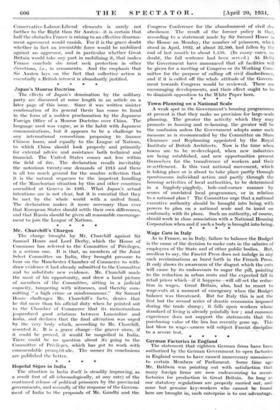Britain and the Collective System The conference in defence of
the League of Nations, held in the City of London last week, was marked by several notable speeches, among which the declarations of Sir Austen Chamberlain on the maintenance of the collective system stand out. The relation of guarantees to security and of security to disarmament need no demonstration today, and it is an event of significance when a public man of Sir Austen's experience, and standing in- the political position which he holds today, declares unequivocally that : " In the light of what British interests will demand and of what will give us security, -1 hold- that our safety is not in isolation, but in the recognition that the aggressor is the common enemy of mankind, and in the establishment of a system which makes it certain that against the aggressor there will be mobilized a force which is irresistible, and which must deny to the aggressor the benefit he hoped to derive from his aggression."
If that policy were unreservedly endorsed by the present Cabinet—and the centre of gravity of its component Conservative-Labour-Liberal elements is surely not further to the Right than Sir Austen—it is certain that half the obstacles France is raising to an effective disarma- ment agreement would vanish. For it is the grave doubt whether in fact an irresistible force would be mobilized against an aggressor, and in particular whether Great Britain would take any part in mobilizing it, that makes France conclude she must seek protection in other directions, i.e., in armaments. And the emphasis that Sir Austen lays on the fact that collective action is essentially a British interest is abundantly justified.













































